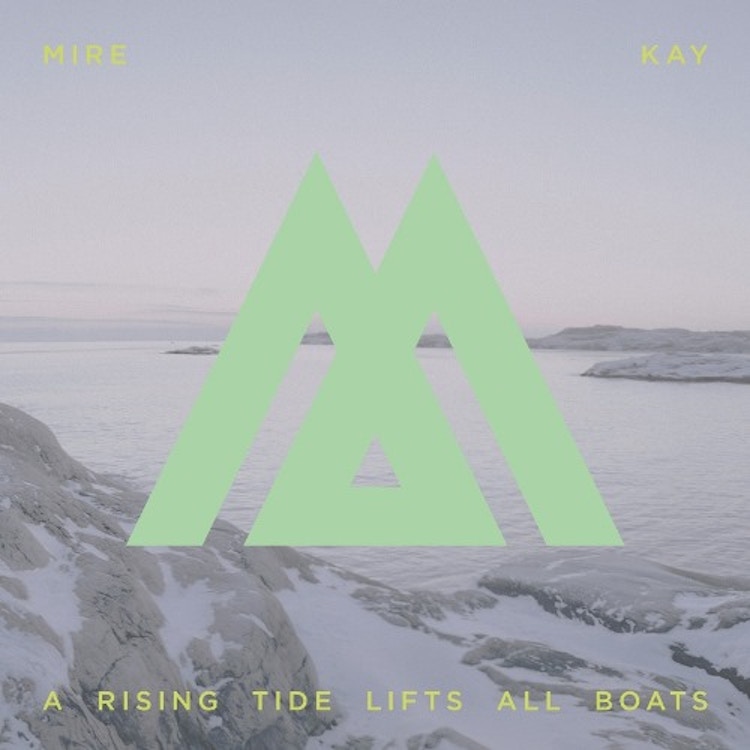"A Rising Tide Lifts All Boats"

We are three full months into 2013 and the temperature in London has barely lifted itself into double figures all year. As I write this, snow is falling. I turn up Mire Kay’s debut album, A Rising Tide Lifts All Boats, and wonder if this isn’t in some way my fault.
Emelie Molin and Victoria Skoglund, the duo who make up the band, are of that breed of inescapably Scandinavian artists, for whom winter is a curse and an inspiration. Their music exudes the cold of their native landscape.
Molin and Skoglund were formerly half of Audrey, a band who developed from largely instrumental slowcore folk through to danceable drum-led indie, but always retained winter in their DNA. A Rising Tide is pitched somewhere in between – not as immediate and accessible as late-era Audrey, nor as ponderous and drawn-out as their earlier work. Mire Kay eschew percussion almost entirely, instead allowing their songs to be driven by a gradual development, using a limited range of instruments to slowly build layer upon layer of textured strings. The gentle acoustic guitar, generally playing clean, open chords, provides the high end, and at the low end, the thick, sweeping cello forms a reference point upon which everything else is built. Sparingly-used piano and violin embellish but never overwhelm, with the focus almost always on Molin and Skoglund’s voices, which are beautiful in their depth and range. This method of composition, coupled with the band’s wide dynamic range, gives a much fuller sound to the music than most five-piece acts manage.
The most immediate comparison is with First Aid Kit, and there is an undeniable similarity, particularly vocally. Mire Kay, however, are happier than their fellow Swedes to sit back and invite the listener in to their world. Where the Söderberg sisters seem to actively seek out your heartstrings, Molin and Skoglund are happier to sit back and let you do the work. Punchy hooks are few and far between; if anything, their choruses seem to recede and pull away from the verses, inviting you further in. There are no shortcuts or easy ways into A Rising Tide. It is a record that demands patience – as the album’s opening lyrics advise: “wait a little longer, dear”. The closest resemblance, for my money, is with Justin Ringle’s Horse Feathers, another act who make effective use of few instruments and whose kicker is their powerful, dramatic singer. There is also an aesthetic parallel to be drawn with Lost in the Fire-era Low, whose minimalistic, less-is-more approach feels like a constant silent influence here.
Though the instrumentation is sparse and evokes the melancholy silence of winter, and barely a song goes by without a lyrical mention of ice, or snowflakes, or “wind bearing down the Gothenburg streets”, it should be made clear that A Rising Tide is not a cold album. No proud Scandinavian could ever have a totally unambiguous relationship with the dark seasons. Mire Kay’s approach to their music is filled with warmth, even while deliberately, on every level, conjuring images of winter. “Days still come, and seasons they’ll change,” sings Skoglund on ‘Somewhere Else Here Still’, adding: “But you came here, and you made a mark”.
Mire Kay’s Last.fm biography states that in the band’s music “the dark and bright are set against each other”. Such write-ups are usually hollow exercises, but this is actually a worthwhile illumination. If Mire Kay’s music is informed by so many frozen winters, this plays out as a battle between the beauty of such environments and the despair. A Rising Tide is, just about, a victory for hope, but the result here isn’t what’s important. Hearing how it happened: there’s the joy.
Get the Best Fit take on the week in music direct to your inbox every Friday

Great Grandpa
Patience, Moonbeam

Deafheaven
Lonely People With Power

Perfume Genius
Glory





